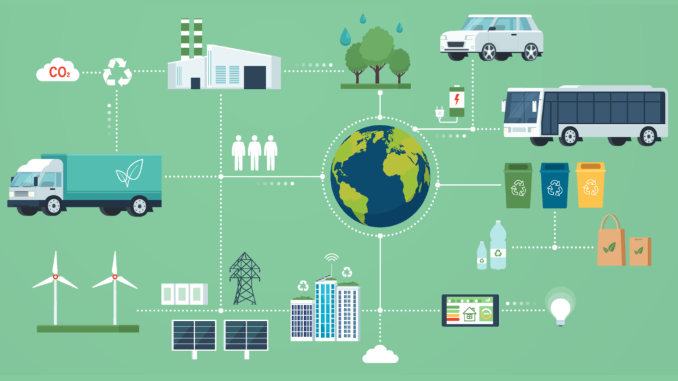
The world is increasingly facing environmental challenges, and the transportation industry is a significant contributor to these issues. However, there is growing recognition of the need for sustainable practices in logistics and transportation. This article explores the importance of sustainability in this sector and discusses various initiatives and strategies to achieve a greener future.
The Environmental Impact of Transportation
The transportation industry heavily relies on fossil fuels, particularly gasoline and diesel, which release greenhouse gases such as carbon dioxide (CO2) and contribute to global warming. Furthermore, exhaust emissions from vehicles also produce air pollutants, including nitrogen oxides (NOx) and particulate matter that negatively impact air quality and public health.
1. The Importance of Sustainability
In recent years, sustainability has gained prominence as a critical aspect of logistics and transportation. The depletion of natural resources, the pressure on ecosystems, and the threat of climate change highlight the necessity for sustainable practices. By adopting sustainability measures, the industry can minimize its environmental impact, reduce costs, and ensure long-term viability.
2. Green Initiatives in Transportation
Various organizations and governments are taking proactive steps to promote sustainability in transportation. These initiatives include: a. Electric Vehicles (EVs) Electric vehicles offer a promising solution to reduce carbon emissions and reliance on fossil fuels. Advancements in battery technology have significantly improved the range and efficiency of EVs, making them a viable option for logistics and transportation. Governments and organizations are incentivizing the adoption of EVs through subsidies and infrastructure development. b. Public Transportation Promoting and expanding public transportation systems is crucial to reducing individual car usage. By providing efficient and affordable alternatives, people are encouraged to opt for public transport, decreasing overall carbon emissions and traffic congestion. c. Alternative Fuel Sources Exploring alternative fuel sources, such as biofuels, hydrogen, and natural gas, can significantly reduce carbon emissions. Biofuels, derived from renewable sources like plant materials, offer a greener option for transportation while reducing dependence on fossil fuels. Infrastructure needs to be developed to support the widespread adoption of these alternatives.
3. Sustainable Supply Chain Management
The concept of sustainability extends beyond vehicles and includes the entire supply chain process. Organizations need to implement sustainable supply chain management practices to minimize waste, optimize routes, and reduce greenhouse gas emissions. a. Efficient Route Planning Optimizing transportation routes leads to reduced fuel consumption and lower emissions. Using advanced technologies, such as GPS and intelligent transport systems, enables real-time route planning, taking into account factors like traffic, weather, and road conditions. b. Collaborative Logistics Collaborative logistics involves sharing transportation and warehousing resources among multiple companies. By consolidating shipments and reducing empty miles, this approach optimizes resource utilization, resulting in lower fuel consumption and emissions. c. Last-Mile Delivery Optimization Last-mile delivery contributes significantly to transportation's environmental impact. Implementing sustainable practices, such as using electric vehicles, bicycle delivery, and efficient route planning, can reduce emissions and improve efficiency in this final leg of the supply chain.
Conclusion
Sustainability in logistics and transportation is a pressing global concern. The industry must embrace sustainable practices to minimize environmental impact, combat climate change, and ensure a greener future. By adopting green initiatives and implementing sustainable supply chain management practices, the logistics and transportation sector can contribute to a more sustainable planet for current and future generations.
